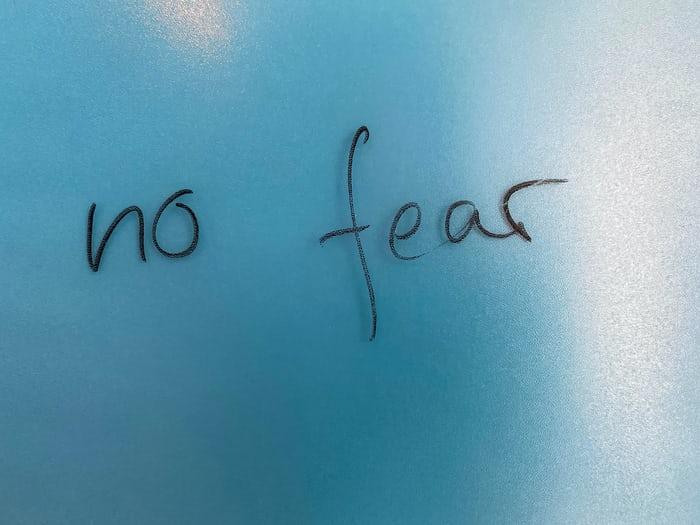Overcoming Your Fears

This thing called fear and the ways towards overcoming it is one of the most personal journeys into healing. We’ve all been down at one time or the other in our lives to play dates with Mr. fear. Whether old, young, small, or big, we all know this feeling all too well. we know what it’s like to be afraid of something, whether it be the fear of falling in love, the fear of going to the dentist, the fear of toppling upside down from an inconceivable height, the fear of looking bad, the fear of the unknown, or even the fear of death—which is in itself futile, as it is inevitable.
We know the familiar feel of these many forms of fear, and you’d agree with me that some of these fears are absurd, while some others can be termed justifiable. However, the truth remains that we hardly learn anything on how best to overcome the cold hands of fear.
What Is Fear?
The Merriam-Webster dictionary defines fear as an unpleasant, often strong emotion caused by anticipation or awareness of danger. Fear is internally engineered into the human body and comes from a part of our brains called the AMYGDALA. This part of our brain is engineered to keep us alive and one of the ways it works is by creating fear to help us steer clear away from danger.
This means that our bodies use fear to warn us of impending danger, and this part of our brains is fast and proactive against a threat. However, it becomes a different ball game entirely when fear becomes a constant without a foreseeable cause. When we let fear become a pattern in our lives, such that we fear before we conceive rationality, then there is a whole lot to be considered.
Over time, we have set up the wrong mindset, and believe fear can only come from a place of insecurities and negativity and so we try to fight fear. However, we fail to realize that fighting against fear is an action that has been wrongly ingrained into us by traditional teachers. We have been taught that fear is the enemy and this misconception has been passed on for years unending. What we’ve failed to realize is this: Fear is natural, fear is human. When we first begin to see it as such, steps to overcoming it would be a whole lot easier.

As young adults, children, teenagers, and aged women there are a lot of things we fear. Sometimes fear fosters and breeds off on our existing predicament or insecurities.
It is for this very reason that Ralph Waldo Emerson quotes that,
He who is not conquering some fear has not learned the secret of life.
Learning to fix and overcome your fears is one of the most paramount aspects of growing up into the reality of what your mind is made of. When fear begins to cause harm to your physical and mental abilities, don’t try to push it away.
According to expert psychologist Trevor Ragan, four things generate and breed fear in us all.
- Uncertainty
- Change
- Attention
- Struggle
It is easier to believe that our fears are only substances of our imagination, and sometimes that which is only imagined cannot be real and true enough to let us. While this may sound like the best tip to overcoming fear on the streets of the internet, does it explain why we have this thing called fear in our lives in the first place? How can something so unphysical hold so much power over us and our emotions? Aren’t our fears crystallized from the tenets of thoughts? The same source from which we create pleasure, pain, happiness, sadness, anxiety, guilt, and most importantly fear. So why then do we learn to thrive amongst all of this, but never learn to accommodate fear as we thrive along in the course of life?

Some symptoms of fear we might experience.
- Anxiety and panic attacks
- Flight instinct
- A pounding heartbeat
- Breathing problems
- Feeling light-headed
- Sweating
- Distancing yourself
Even if you know your fear is unreasonable, you may feel powerless in the face of it. The truth is that any of us can learn to beat fear, but how we do that may be completely different with various individuals. With this in mind, I’ve compiled a list of the best tips that can help almost anyone overcome fear. Come along, let’s find out together.
1. Step Out Of Your Comfort Zone
The term “comfort zone” means several things to several people, so your definition might not resonate the same way as mine, however, the consequence is generally the same when we walk out of ours. It’s known as fear. And fear is terrifying. However, other sorts of fear are imagined, and we have some influence over them. Fear is a priceless commodity. It ensures people’s safety and encourages prudence when it’s necessary. But it’s also a constraint: not everything you’re scared of is deserving of your apprehension or caution. And sometimes, moments of bravery are just what you need to improve your life.
There isn’t much incentive for people to push themselves to new levels of performance while they’re in their comfort zone. People go about their daily routines without taking any risks, causing their advancement to stagnate.
Ease zones, in reality, are more about fear than comfort. To get outdoors, break the bonds of fear. Once you’ve done so, you’ll discover that taking risks and improving as a result of them is something you’ll look forward to. Take your list of annoyances and dig a little deeper. Keep in mind that the main emotion you’re attempting to overcome is fear.

2. Overcoming Fear Is A Skill. The More You Do It, The Better You Get At It
It is pertinent to recognize that it’s normal to be afraid. Fear is a survival mechanism that allows us to live longer. Do you ever walk up to deliver a speech or enter into a snake-dominated territory and feel terrified? This is adaptive fear, and it warns you that “this could be dangerous” our internal radar automatically tenses our brains with the words “Be cautious, thereby activating fear in our bodies which prepares us to act to protect ourselves.
Recognize that fear can be beneficial and that it serves a protective function. Overcoming this overtly sensitive radar in our heads is by dancing with it. Now, you can be scared to speak before the crowd and not go ahead, or choose to be scared and still go ahead regardless. When we emerge successfully from the constraints of our fear, after a while, we tend to numb our fears in that aspect completely. Having a phobia for bikes would only disappear after such an individual has practiced the art and craft of biking to kill the existing fear.
When fear meets practice and competence, fear always reclines to the back seat. It’s a skill because we face new fears every day, and the practice of overcoming them would take deliberate practice.
3. Know Your Fear
Imagine trying to overcome something that you don’t truly understand? instead of trying to run away from our fears, It’s best advisable to be confrontational about your fears. After all, you can only fully tackle that which you have an idea of. When we turn our face towards our fears rather than away from them, we notice things about our minds that we didn’t know before. This realization would help you overcome it faster in your way…
Even to yourself, it’s simple to dismiss or deny your anxieties. But you can’t have courage until you’re afraid to face your fears. You’ve taken the first step toward obtaining control of the issue by admitting your sentiments. Because fear is such an unpleasant emotion to deal with, it’s easy to avoid it by sitting back and working your way around it. You will be holding yourself back and may miss out on significant opportunities for personal progress if you do so. You will constrain your potential to multiply and flourish if you allow fear to rule your life.
Pushing past your fears, on the other hand, reveals that you are capable of far more than you could ever believe.
4. Identify False Beliefs
Some of our fears are rooted in false beliefs and superstitions that were fed to us from a tender age. For instance, some adults still fear spiders or elevators because of a past incident. A childhood experience that would not let them be free. Identifying that this is the origin of such a fear is one of the best ways to overcome it.

5. Tweak Your Imagination Towards Positivity
Albert Einstein once said that imagination is everything. It is the preview of life coming attractions. Seneca crystallized his thoughts by revealing that:
We are more often frightened than hurt, and we suffer more from imagination than from reality.
This is completely true as we can never underestimate the power of our imaginations. Suffering in our imagination is the worst thing we can do. People are plagued by worries that will never come true, and they have regrets as a result of events that should no longer be a part of their lives. They are caught in the middle between the past and the future. We must direct our imagination rather than allow it to direct us.
We behave in a specific way because our imagination tells us to. We do things because we envision the benefits in our heads. As a result, all of our concerns stem from our imagination. Researchers from Ohio State University discovered in 2012 that people with a good attitude were more likely than those with a negative imagination to overcome their fear of public speaking after exposure therapy. According to studies, having a positive mindset can assist us in overcoming our worries.

6. Introduce Mindfulness
Mindfulness is a sort of meditation in which you focus on being acutely aware of what you’re sensing and feeling in the present moment, without judgment or interpretation. Mindfulness is a relaxation technique that uses breathing techniques, guided imagery, and other techniques to assist the heart and brain and calm the mind. Employing this form of meditation to combat fear would give you the independence that you desire.
Some other additional tips to overcoming fear
- Don’t fight fear
- Talk about your fears
- Don’t try to be perfect
All images are sourced from Unsplash.com
The one who spells Afrolady from the larynx of her pen. She’s a high spirited, cultured and ingenuous African child, whose writing drops an unimaginative creative splash on history and carves the indignation and memories of Black women.

